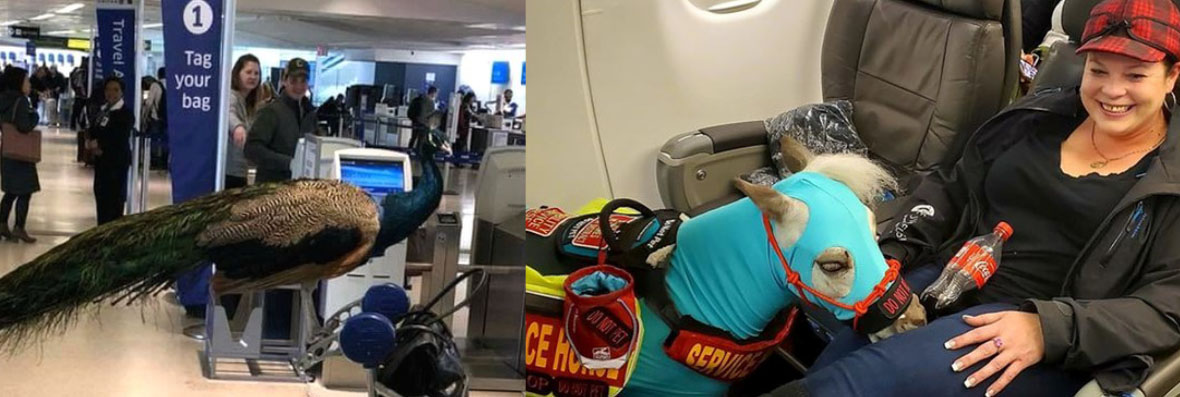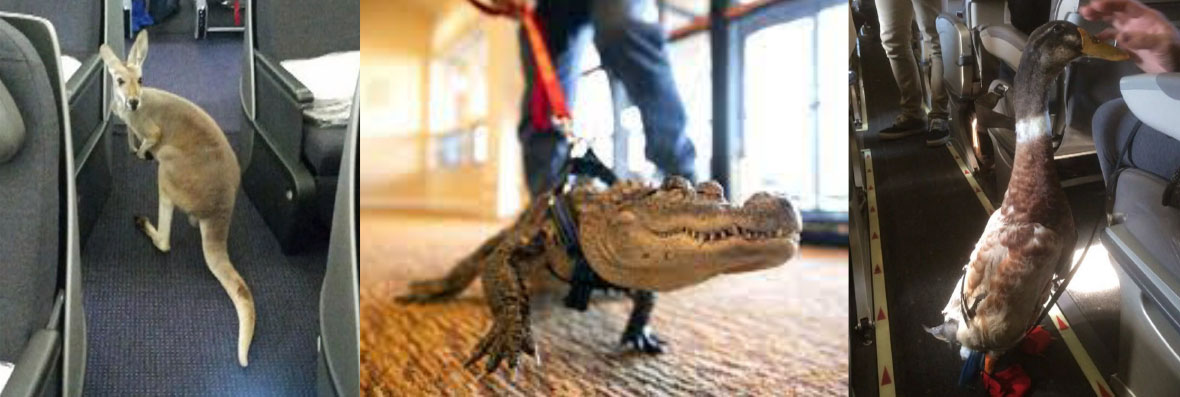In a policy change effective March 1, this year Air Canada implemented a ban on emotional support animals in its cabins. The airline continues to allow customers to board with a service dog at no charge and passengers with a small pet cat or dog are allowed to bring the pet in the cabin for a fee, so long as it stays inside its carrier under a seat. This thankfully will help prevent the flagrant abuse by some pet owners of cabin privileges for their less than supportive pets.
Air Canada defines “service dog” as “a dog that has been individually trained to do work or perform tasks for the benefit of a person with a disability.” Obviously, it is appropriate that such an animal is necessary for the comfort and safety of its owner. They are professional carers and they behave as such.
If an emotional support animal does not fit the definition of a “service dog” then it is treated as a pet under the company’s policy. That seems eminently reasonable but is causing some antipathy from a highly vocal and burgeoning industry selling support documentation, apparel, gear and anything else you can think of, for pets whose owners choose to deem emotionally supportive.
Air Canada’s decision came as a result of the US Department of Transportation’s revised regulations which no longer require airlines to permit emotional support animals in cabins. The ban is also intended to improve passenger safety and comfort, as Air Canada reported incidents of staff and customers being harmed by emotional support animals.
Air Canada’s new rules are consistent with the Accessible Transportation for Persons with Disabilities Regulations under the Canada Transportation Act, which apply to airlines and other transportation bodies.
Under these regulations, a carrier (which includes an airline) is required to accommodate a person with a disability who needs to travel with their service dog by allowing the service dog to accompany the person on board. However, the person who requests the accommodation must confirm the animal has been specially trained by an organization specializing in service dog training.
As the regulations only require carriers to provide accommodations for service dogs, airlines are left to make their own decisions about whether they will allow emotional support animals, or any other animals who don’t meet the definition of a service dog, on board.
However, the policy change does highlight the inconsistent frameworks of federal and Ontario regulations relating to service animals.

Emotional support animals apparently provide comfort and companionship to people diagnosed with a disability. While a service dog will receive formal disability‑related training by specialized organizations, emotional support animals are often not formally trained to assist a person with a disability. Service dogs usually receive certification, but there is no recognized certification for emotional support animals, though dubious documentation is widely available on the internet.
Ontario human rights and accessibility law (which does not apply to airlines in Canada) recognizes a wider range of animals as “service animals.”
Case law from the Human Rights Tribunal of Ontario recognizes that “service animals” include animals who are not trained or certified by a recognized disability‑related organization and who assist people with mental disabilities. However, the person claiming the accommodation must be able to show evidence (such as a letter from a medical professional) that they have a disability and that the animal assists with their disability‑related needs.
That’s all well and good, but unscrupulous travellers are attempting to claim they require “emotional support” from a wide array of animals (and birds) including, among the more unusual, pigs – large, small and incontinent, kangaroos, horses (small), parrots, peacocks, alligators and snakes. Untrained dogs have pooped in the aisles (why should that be confined to pigs), bitten other passengers and otherwise misbehaved. Frankly, some of these animals appear to need – rather than offer – “emotional support.”
And really, especially in the current climate of social distancing and masking and agitated travellers, if you are so emotionally fraught that you cannot fly without the pooping pig, or the distressed dog, perhaps you should drive and save everyone – especially the poor flight attendants the emotional stress of dealing with you and all the other complaining passengers.
Prairie Conlon, who utilizes animal assisted interventions in her mental health practice in the US slammed the airline ESA ban: “We know that service animals and emotional support animals are very different and they serve different purposes. But how can they say that someone with a physical disability, or certain mental disabilities like PTSD can have a service dog when they have a legitimate need for them, but someone who has been diagnosed by a clinician with a mental health disorder and has a legitimate need for them can’t have their animal with them anymore? That is textbook discrimination. To put it more simply, the airlines are saying that if you have a physical or medical disability you can have an assistance animal, but if you have a mental disability, you can’t.”
Actually, that’s not what the airlines are saying. What the airlines are quite correctly trying to prevent, is the flagrant abuse of untrained “emotional support animals” travelling in the aircraft cabin and disrupting other passengers and cabin crew.
Just take a look at the emotional pet support site.


